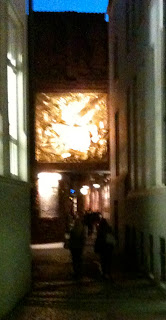Taste: The Story of Britain Through its Cooking by Kate Colquhoun
My father wanted me to be a cook. I am not sure why. Maybe because I made him jam doughnuts once in a deep fat fryer. I remember that was the time I really impressed him. Never mind books or academic qualifications - what the good of them when I could successfully wield the cage of the deep fat fryer? Cooking was much more useful - especially (though he didn't actually say the next bit) for a girl.
How did you do that?' he asked in wonderment as my doughnuts haemorrhaged jam just like the ones in the shops.
'It's easy,' I said, because it was. All I had to do was follow instructions in one of the leaflets by the mixer. Still, it impressed my father so I was pleased.
'You could go to catering college,' he pointed out, so I thought about it for a bit.
'No,' I said, 'all I want to do is write.'
Now I'm thinking maybe I should have listened to my father. I could have become a cook and then written about it. People like food a lot more than they like science or all the sorts of things I went on to learn. Food is endlessly interesting to just about everyone because we all have to eat.
I bought Taste: The Story of Britain Through its Cooking by Kate Colquhoun for my Kindle a few months ago and over the last few days just got round to reading it. The book has turned out to be a valuable addition to my library. It is comprehensive and very interesting. I now feel I have a good general idea of how the British taste for food changed over the centuries - and change it did, quite radically, many times. Going from Pre-Roman times the book works its way through the centuries showing how fads for food reflect the wider foibles of the time: periods of austerity are reflected in unadventurous aspirations in the kitchen; while during more flamboyant times the cooks tended to look to more exotic places for inspiration. The mores of the times are illustrated by menus from cookbooks, quotes, illustrations of equipment and other cultural references.
One of the more unexpected benefits was the way I learnt the origins of new words. Curfew comes from the Norman laws that all embers (feu) must be covered (cur) during the night, for instance, and there were more additions like these in nearly every chapter.
It made me notice what I was eating and cooking and changed my perspective now that I had some knowledge of their history. Virtually each era introduced something different. It ends with the modern plea encouraging us to all go back to real cooking using real ingredients. It reminded me of the fun I can have, and made me determined to try and eat fewer convenience foods and get back to the greengrocer and the butcher (or the equivalent in the supermarket). I should make more of my friendship with my oven, kettle, mixer and hob - but not, perhaps, the deep-fat fryer.




































































